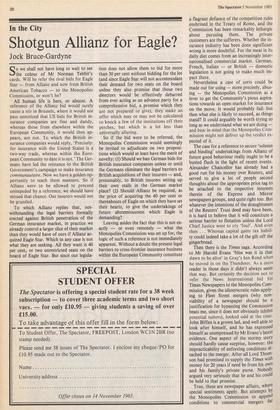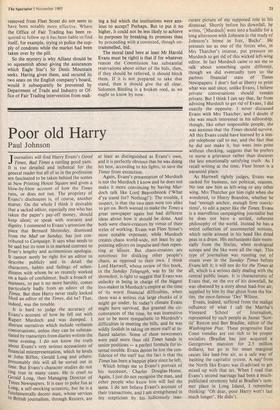In the City
Shotgun Allianz for Eagle?
Jock Bruce-Gardyne
So we shall not have long to wait to see the colour of Mr Norman Tebbit's cards. Will he refer the rival bids for Eagle Star — from Allianz and now from British American Tobacco — to the Monopolies Commission, or won't he?
All human life is here, or almost. A reference of the Allianz bid would surely cause a stir in Brussels, where it would not pass unnoticed that US bids for British in- surance companies are fine and dandy, whereas those from elsewhere within the European Community, it would then ap- peare, are not. To which the British in- surance companies would reply, 'Precisely: for insurance with the United States is a two-way trade, whereas within the Euro- pean Community to date it is not.' The Ger- mans have led the reistance to the British Government's campaign to make insurance
corn Now we have a golden op- portunity to teach them manners. So if Allianz were to be allowed to proceed unimpeded by a reference, we should have missed that chance. Our insurers would not be gruntled.
To which Allianz replies that, not- withstanding the legal barriers formally erected against British penetration of the German insurance market, in practice we already control a larger slice of their market than they would have of ours if Allianz ac- quired Eagle Star. Which in any case is not what they are seeking. All they want is 40 per cent, or two unrestricted seats on the board of Eagle Star. But since our legisla-
tion does not allow them to bid for more than 30 per cent without bidding for the lot (and since Eagle Star will not accommodate their demand for two seats on the board unless they also promise that those two directors would be effectively debarred from ever acting as an advance party for a comprehensive bid, a promise which they are not prepared to give), they make an offer which may or may not be calculated to knock a few of the institutions off their perches, but which is a lot less than universally alluring.
So if the bid were to be referred, the Monopolies Commission would seemingly be invited to adjudicate on two proposi- tions which would at least have the merit of novelty: (1) Should we ban German bids for British insurance companies unless or until the Germans eliminate the legal barriers to British acquisitions of their insurers — and, presumably, to British insurers setting up their own stalls in the German market place? (2) Should Allianz be required, as the price of acquiring the 40 per cent or thereabouts of Eagle on which they have set their hearts, to give the undertakings of future abstemiousness which Eagle is demanding?
Leaving asides the fact that this is not ex- actly — or even remotely — what the Monopolies Commission was set up for, the logic of such a reference is not immediately apparent. Without a doubt the present legal barriers to cross-frontier insurance business within the European Community constitute a flagrant defiance of the competition rules enshrined in the Treaty of Rome, and the Commission has been remarkably lethargic about pursuing them. The private customers are the sufferers. Whether the in- surance industry has been done significant wrong is more doubtful. For the meat in its daily diet comes from an increasingly inter- nationalised commercial market. German, French, Italian — or British — domestic legislation is not going to make much im- pact there.
Nevertheless a case of sorts could be made out for using — more precisely, abus- ing — the Monopolies Commission as a lever to get the Community's pious aspira- tions towards an open market for insurance on the move. It would probably fail: but then what else is likely to succeed, as things stand? It could arguably be worth trying so long as we understand what we are doing and bear in mind that the Monopolies Com- mission might not deliver up the verdict ex- pected of it.
The case for a reference to secure 'solemn and binding' undertakings from Allianz of future good behaviour really ought to be a busted flush in the light of recent events. Alexander Chancellor has already had a good run for his money over Reuters, and served to give a lot of people second thoughts about the appropriate price tag to be attached to the respective interests therein of the Express and Mirror newspapers groups, and quite right too. But whatever the intentions of the draughtsmen of the Reuters' Trust deed may have been, it is hard to believe that it will constitute a serious barrier to flotation unless the Lord Chief Justice were to cry 'foul'. And even then ... Whereas capital gains tax liabili- ty could indeed take a lot of the gilt off the gingerbread.
Then there is the Times saga. According to Mr Harold Evans 'bliss was it in that dawn to be alive' in Gray's Inn Road when he moved in on the Thunderer. As a mere reader in those days it didn't always seem that way. But certainly the decision not to refer the News International bid for
Times Newspapers to the Monopolies Com- mission, given the idiosyncratic rules apply- ing to Fleet Street mergers (why non- viability of a newspaper should be a justification for bypassing the Commission beats me, since it does not obviously inhibit potential suitors), looked odd at the time. John Bif fen is a grown lad, and well able to
look after himself, and he has expressed
himself as unimpressed by Mr Evans's latest evidence. One aspect of the stormy story should hardly cause surprise, however: the
impracticability of enforcing conditions at- tached to the merger. After all Lord Thom- son had promised to supply the Times with money for 20 years if need be from his own and his family's private purse. NobodY argued very seriously that he and his could be held to that promise.
True, these are newspaper affairs, where special sentiments apply. But attempts by
the Monopolies Commission to append conditions to commercial mergers far
removed from Fleet Street do not seem to have been notably more effective. Where the Office of Fair Trading has been re- quired to follow up it has been liable to find itself, for example, trying to police the sup- ply of condoms while the market had been taken over by the pill.
So the mystery is why Allianz should be so squeamish about giving the assurances which Eagle Star's Sir Denis Mountain seeks. Having given them, and secured its two seats on the English company's board, would it subsequently be prevented by Department of Trade and Industry or Of- fice of Fair Trading intervention from mak- ing a bid which the institutions were anx- ious to accept? Perhaps. But to put it no higher, it could not be less likely to achieve its purposes by breaking its promises than by proceeding with a contested, though un- trammelled, bid.
The moral (and here at least Mr Harold Evans must be right) is that if for whatever reason the Commission has substantial reservations about either of the bids, then, if they should be referred, it should block them, If it is not prepared to take that stand, then it should give the all clear. Solomon Binding is a broken reed, as we ought to know by now.















































 Previous page
Previous page